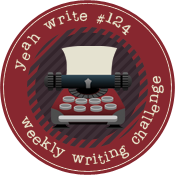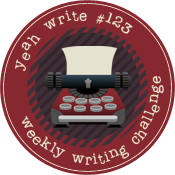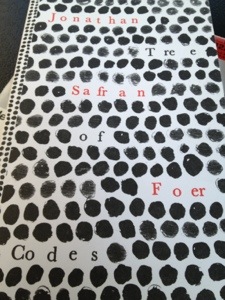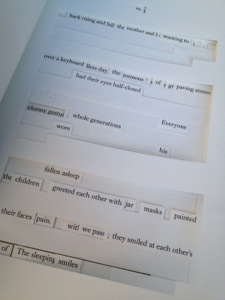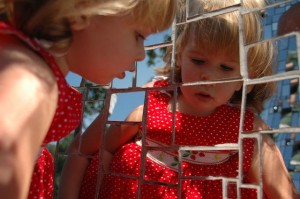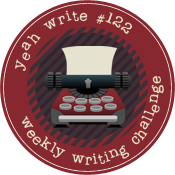Note: This is a story about my Aunt Rose Ann, my mom’s younger sister. My mom told me this story many times as I was growing up, and I am still very careful at the beach to this day.
“Don’t go out too deep,†Mother said, putting the thick white sunscreen on my face. “Make sure you can see me, do you understand?†she asked, serious. Her mouth drooped at the edges. “I can’t swim out to come get you, Rose Ann. Stay with your sister and brother.â€
“Yes, Mother,†I shouted, running away across the sand. I jumped into the waves to cool off my feet. “Carole! Let’s play!†I called to my sister, who was walking along the edge where the water met the sand.
“Let’s pretend that Norman is a monster coming to get us,†I said, kicking the waves. Norman was ahead of us in the deep water, riding the waves in.
“Okay,†she mumbled, still walking.
The next time Norman rode a wave in, I ran up, jumping the wave. “Aaaahhhh!†I screamed into his face as he got close. I splashed him in the face with water and then ran away. Carole watched from where she was, laughing.
“Hey, watch it, Raggedy Ann!†Norman said, wiping the water out of his eyes. He turned and swam back out past the crashing waves. He didn’t ride the next few.
I walked along the beach away from Carole, jumping the waves as they came. After a while, I turned around. I could still see her. She had bent down to build a sandcastle. Maybe I’ll go help her in a minute, I thought. I liked jumping over the waves, though. As I got farther away from my sister and brother, I passed two girls the same size as me, splashing each other. I joined them, laughing as they splashed me back.
“Let’s play mermaid,†one of them said.
“Yeah!†I said. “Let’s pretend we are beach wrecked and we can’t move until a prince comes and kisses us to give us our human legs,†I said. I like to make up stories to go with games. We all found a spot on the sand and started burying our legs. The sand felt cool and heavy on my legs.
“Come on, girls!†a man called to my new friends. “Time for lunch!â€
“Alright, Daddy,†they answered at the same time.
I glanced down the beach. I could see Carole in her red swimsuit, building her sandcastle. I stayed for a few more minutes buried under my mermaid tail, then I jumped up and ran back to the water. I stood in the waves, letting them crash on me. I liked the stinging feeling. After a while, I turned the other way and let the waves crash on my back. Then I looked to find Carole, but she wasn’t there anymore. I started walking to find her. I passed more kids, more parents in chairs on the sand. I didn’t remember passing any of them before, but I wasn’t worried.
As I walked, I made up a song. I liked to do that whenever I was by myself. “Waves, waves, try to get me, waves,†I sang. “You can’t reach me, waves, you’re too slow.†As I sang, I ran away from the waves onto the sand.
I sang and ran farther and farther. I did not see Carole or Norman, or mommy. I started to feel thirsty, so I kept walking. The other kids playing in the water started to sound really loud, so I put my hands over my ears.
Where were they? I wanted some of the juice that Mother packed. I wanted my butter and jelly sandwich, too. Did Mother leave without me? I started to get angry. I ran faster, my hands still on my ears. I could feel my heart pounding hard in my chest. All of a sudden, I got tired of running, so I sat down. I kept my ears covered. I looked but didn’t see Carole on the sand. I didn’t see Norman anywhere in the water. Mother was not sitting on her chair by our colorful blanket. They all left me. I started to cry.
I cried for a while, getting louder.
After a while, a lady with a baby came over by me. She sat down and put her arm around me.
“Are you okay?†she asked. Her eyes looked scared, but she was smiling. She looked nice, nicer than Mother. Her baby was cute. He pulled my hair. “Sorry about that,†she said, taking his hand off my hair.
“Air!†the baby said, reaching for my hair again.
“It’s okay,†I said, wiping my eyes and handing him some of my hair. “I like babies.â€
“Okay, then,†the lady said. “Sweetie, where is your mother?†she asked.
“I don’t know. I think she left without me,†I told her, even though I didn’t really think that. Maybe if she believed me, she’d take me home with her. I’d like a baby brother.
The baby brushed my hair on his face, laughing. I liked him, and I tickled his foot.
“She left without you?†the lady said, surprised. “I don’t think so. She must be around here looking for you.â€
“No, she never looks for me,†I told her. “She’s always mad at me and she’d probably be glad if I was lost forever.â€
“No, young lady, that’s no way to talk about your mother,†the lady told me. Now her mouth turned down at the edges like Mother’s did. “Let’s go look for help,†she said, standing up and lifting the baby into her arms. “Come along.â€
I walked with her but a little apart, up the beach to the lifeguard chair. The lady spoke to the lifeguard for a minute, and he stood up and waved some red flags in the air.
“He’s calling the police officer for help,†the lady told me.
A few minutes later an officer walked down from the boardwalk. He looked hot.
“Hi, there, little miss,†he said to me. He was friendly. If I had a dad, I’d want him to be like that.
“Hi,†I answered. I should have said sir, but I didn’t.
“Where is your mother?†he asked.
“I don’t know,†I said. Why did everyone keep asking me the same questions? “She left without me,†I said.
“Don’t be sassy, now,†the lady said. Her little boy was struggling to get down.
“Do you know your name, young lady?†the police officer asked me. Of course I dp. I’m four and a half.
“It’s Rose Ann,†I said loudly. “My mom is named Dora but she likes to be called Dorothy. My sister is Carole Lee and my brother is Norman. My dad was Sam but he died in the war when I was a baby. I never met him.â€
“Well, that is too bad, little miss,†the police officer said. He looked sad. The lady made a clucking sound with her tongue and reached over to rub my back. “Listen, Rose Ann,†I’m going to take you back to the police station to wait until we can track down your momma.â€
“Okay,†I said. I like adventures a lot and this sounded like a good one. I was excited.
“Wait just a second, alright?†the lady said, and carried her baby over to the ice cream cart nearby. She bought two ice cream cones and handed one to her boy and brought the other one to me.
“Oh, wow!†I said. “Thanks!†Mother hardly ever let me have ice cream. I unwrapped it and started eating.
“I’m so sorry to hear about your dad,†the lady said. She looked very sad.
“It’s okay,†I told her. “I’m used to it.â€
The police officer took my hand and started to lead me away. “Thanks, now, Ma’am,†he said to the lady. As we walked away I glanced over my shoulder at her and her baby. I wished I was leaving with them, that they were my family. The lady was super nice, way better than Mother. I bet she would never leave me at the beach.
When we got to the police station, Mother was there with Carole and Norman. She was crying and so was Carole. Norman looked bored. Carole hugged me tight, saying “I’m so glad that you didn’t drown.â€
Mother looked at me with her usual gloomy eyes, and said “Why didn’t you stay where I asked you to?†She sounded so angry.
“Ma’am, the undertow is very strong today,†the officer told her. He put a hand on my shoulder. “It could have happened to anyone,†he said. “But you are a very lucky young lady,†he said to me. “Please be careful and stay with your family from now on, alright?†he patted my shoulder. I wished I could stay with him here at the police station. Maybe I could be a police officer in training.

